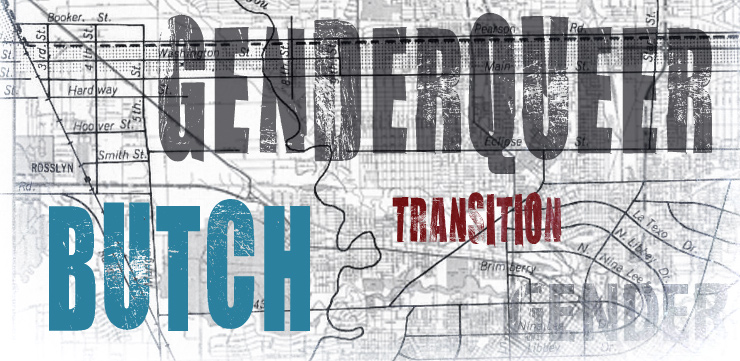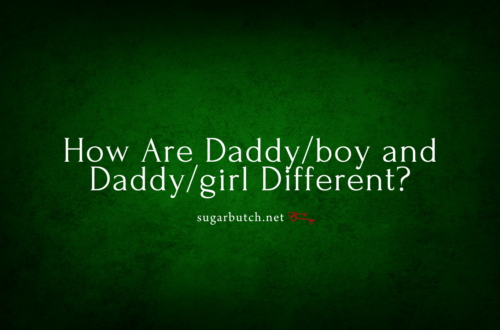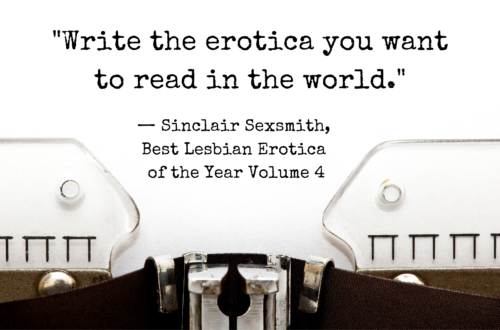I’m a trans guy who used to identify as genderqueer, but for me it was more of a stepping stone because I was afraid to come out all the way (like gays who falsely identify as bi at first). A lot of what you’re saying resonances with my own gender history, so I’m curious where the difference lies, given that I’m someone who continues to be uncomfortable with misogyny and male privilege but still wants very much to be seen and treated as male. Or is *that* the difference?
—ASQ, on Coming Out Genderqueer
It is definitely true that I don’t have investment in being seen and treated as male, but I DO have investment in not being seen or treated exclusively female. There’s a subtle difference there. And sure, maybe that is the difference between me and a trans guy. Definitely a few of my close trans guy friends have a very similar gender history to mine, too, and then at the final step 128 or whatever, mine says, “and that’s why I’m butch!” and theirs says, “and that’s why I’m a guy!” Being seen or treated as male doesn’t feel important to me or my sense of self, at least not currently. I reserve the right to change my mind on that at any point, if and when it shifts, but that’s been true for almost fifteen years now, so I am starting to relax into thinking it will remain true for a while. Butch feels good. Genderqueer feels good. Trans feels good, but mostly as an umbrella descriptor, as a community membership. More trans-asterisk (trans*) than capital-T Trans, but either are okay. (Kind of like how lesbian and dyke are okay, too, almost good, but mostly just adequate, though not quite accurate.)
I have a LOT of thoughts about all of this—especially how I identify, and my own gender journeys—that are way more complicated than the “Coming Out Genderqueer” article above. That article is purposefully distilled, attempting to talk to people who aren’t in any gender worlds. It’s a rough sketch beginning of all of that, at best, and sometimes broken down more simply than I mean to for the sake of accessibility.
Honestly, there’s no way I could answer “if I had been born male would I still be genderqueer” etc etc. I have no idea. For as much as I study gender constantly, I’m not really sure what being born male would have changed. Everything? Nothing? I just don’t know. I have speculations, but it seems unnecessary to entertain to me. And “if we had full gender equality and the boxes of ‘man’ and ‘woman’ were much wider than they currently are, do you think you would still consider yourself genderqueer, or would you then be comfortable being one or the other?” I have no idea. A society which had wider expression of gender than ‘man’ or ‘woman’ wouldn’t be where I live, so how many other things would have to change too? I’m a buddhist, I believe in interdependence—I don’t think we could change one big thing without a whole lot more changing, too.
I’d say that my most important identification is in being in-between, or outside of, a binary system. Would that still be true if I was male? I don’t know—probably. Assuming that I would have roughly the same personality, would still be a writer, would still really love satsuma oranges, would still crave the ocean, would still get stunned looking at the stars, would still find so much joy in swing dancing—assuming all those personality things were still true, then yes, I assume I would still crave being on the outskirts of things, the margins, where the weirdoes live, on the borderlands (to borrow from Anzaldua). I like the view from here. I get a better view, though it disenfranchises me a bit, too. The edges of things, more than anything else, seem to be where I am drawn. Not to one particular thing—masculinity, or genderqueerness, or transness. It isn’t about those things so much as it’s about being on the edge, for me.
And, a part of me is softly hurt by your comment, of yet another person asking me yet again, basically, if or when I am going to transition. Or rather, if butch is a stop over on the train to maleness. Or, if I was male, would I “have to” be genderqueer. I can’t tell you how many dozens (hundreds?) of people—butches trans men femmes, genderqueer agender androgynous queers, all sorts of genders, over the years, friends and lovers and people who talked about me rudely behind my back, so many of them at one point or another said something, either directly or indirectly, about my—and often, EVERY butches’—inevitable transition. I think butches get this all the time.
I think it’s quite a common story for many trans guys to spend some time presenting as butch, or as masculine identified women in some way, or as genderqueer, or as rejecting gender in some way. Like you wrote—(like gays who falsely identify as bi at first). Yes, that is sometimes part of the story. But it doesn’t apply to everybody all the time, and just because it happens sometimes doesn’t mean that there aren’t people who find a butch identity and stay there, people who never transition to male, who never secretly wish for maleness, or to be seen and treated as male.
Folks in the bisexual identity—to continue to borrow your example—get this all the time too, with people around them assuming, at least for quite a while in the beginning, that bi will be a stopover to gay town. Sometimes it is. But sometimes, it isn’t.
So, is genderqueer a political identity for me? Fuck yes it is. Is it an innate identity? Uh I mean how can we know what’s “innate” and what’s learned, especially when it comes to gender? But say, for a minute, that I do know—I would answer, Absolutely yes. Which one is more powerful? Fuck, I have no idea. That’s like asking me to rank my oppressions, or tell you whether I identify as an Alaskan or a writer first. I can’t hierarchize those. It is a radical, political act to reject the two-party binary gender system, and I like radical acts. I get off on ’em. It also feels like home in my body in a way my body never felt like home when I was dressed up more femininely, and never felt/feels like home when people refer to me by he/him pronouns. They/them and genderqueerness and in-between feels like all kinds of parts of me can be acknowledged—not “the man and the woman,” because for the most part I feel like those don’t even apply. None of the above. But the writer and the Alaskan, the swing dancer and the cockcentric top, the pretty good cook and the freelancer, the stargazer and the reader, the masculinity and the love of ice cream. The traits that I have that are traditionally masculine, the traits that I have that are traditionally feminine, and whatever in between.
I want to be able to pick + choose whichever ones suit me from whatever possible category. And I want others to have that ability, too, should they want it. I think it’s possible.
Also, I’m sorry—I don’t mean to be snappish about this, and I explicitly DID say, go ahead and ask questions. So, thank you for asking. I’m trying to answer honestly as best as I can, and honestly? Part of me is frustrated with that question, and the commonness in the queer worlds. I am heavily invested in butch as an identity all its own, regardless of the other genders or identities that that person carries too. I am invested in butch identity not only politically, not only for other people, but for my own sake. I am invested in my butch identity. Am I going to always be butch? I don’t know. Do I have secret longings to be male that are unrealized? Not currently, from the best that I know about myself, no.
Do I reserve the right to decide otherwise in the future? Fuck yes.
But … I hope, if I do decide I want to transition, to identify as male, to be perceived as male and treated as male, that I will honor the 35+ years (or, I suppose, arguably, the 15+ years, since I was mostly some other figuring-out-puzzling-frustrated version of me until I was about 20) I spent as a female genderqueer trans masculine butch. One of my most touching moments at BUTCH Voices in New York City in 2010 was when someone, during our ritual/keynote, held up a stone and offered: “My commitment to my trans voice is to honor the butch woman I was for 40-some years.” I know that many trans men were never butch, that if they were a masculine-presenting-woman for some length of time it might’ve been part of their transition, part of their path to male, part of survival, the only option they had, or who knows what kind of other things, and perhaps they never fully occupying the claimed identity of butch. And, similarly, some butches are never secretly wishing to be men.
I only speak for myself, but I, for now, am eagerly comfortable and loving the in-between of genderqueer.





As a genderqueer person I’ve always been really disturbed that the primary way of considering genderqueerness is as a political or transitionary identity, as opposed to, an actual gender? Which it is? And I don’t think considering it primarily as it’s own gender invalidates the experiences of those who do experience it as a transition to a binary gender, because, gender fluidity is a thing? But primarily considering it as that is invalidating and erasing to genderqueer people, especially those of us who are undergoing medical transitioning, as genderqueer the entire time.
We’re real. We exist and we have history and we need to be respected outside the idea of actually being or eventually becoming binary.
thank you for this.
i stopped counting years ago how many people have told me that i will be a dude one day, without bothering to ask me for my input on the matter. at one point i was at a community gathering and was called boy by someone. i spoke up and stated that i am a butch top, and no one’s boy. the person making this assumption told me, “give it a few months, and you’ll be on T.” i shook my head and walked away.
folks all throughout my life have placed ideas about who or what i am on the body of queerness and defiance that i view as a temple, something to be proud of. this has resulted in a certain amount of shutdown and back up that i see reflected in too many parts of a community that i was taught as a baby dyke to reach out to in times of feeling othered. so often it feels like my identity gets shoved into a box of invisibility. this sucks, especially when the rest of the world sees me as so visibly different from the norm, and reacts in varying degrees of harassment or unwillingness to treat me as a human being. anything from clerks and waitresses going out of their way to call me lady or gal (to deal with their discomfort resulting from viewing my stunningly dapper self), to frat boys holding me against a wall with fists drawn, calling me a faggot. like many things in life, it just isn’t fair, but i deal with it. somewhere along the line, being butch came to mean sitting down, breathing deep, and independently dealing with the deep cuts forced upon me by a community who couldn’t hold me when i hurt because their hands were slippery with my blood. butch shouldn’t have to mean this. i am not a “part of a dying breed because all the good butches are becoming men.” i am not a unicorn that is up for objecificaion (unless you ask nicely). i am an ally, an activist, a holder of safe space without questioning what that space is shaped like. all that i want is a soft place to land, a place that doesn’t label me without taking a moment to ask me about who i am, how i see things, and celebrating my tenderhearted way in a world full of prickly judgements and dirty looks. i am butch, and it doesn’t have to mean anything other than the fact that i defy stereotypes daily while looking damn fine opening doors and sporting a hanky.
i am so incredibly grateful to you for posting this response that puts such inspiring words to a soundtrack that has been blasting from within my heart for years.
*wipes a tear*
thank you.
Gah! I wish I knew who you were so that I could find you on Twitter, Facebook, or just find a blog of yours. Your comment was so so so well written. “being butch came to mean sitting down, breathing deep, and independently dealing with the deep cuts forced upon me by a community who couldn’t hold me when i hurt because their hands were slippery with my blood.” Wow.
Anyway, thank you for sharing this comment on this excellent post. It’s very timely for me as I’m working on a YA novel about a teen girl who would like to continue to identify as a girl, except her gender expression makes everyone around her assume she’s trying to be a boy, making her question where she belongs and wonder if she’s unknowingly in the process of transitioning without trying to be.
Thanks for the insight!
This is an amazing articulation on identity. Having to defend your identity is so difficult and I was impressed with how you handled this. I’ve been struggling a lot with the lesbian community since I identify as queer and have been attracted to and dated trans* people. I accepted having questions from straight people, but it hurt and was so difficult when the LGB community questioned me and didn’t accept me. I wish I had been able to be this articulate. The ending of this is so powerful. You are real, you do exist. We all do. We deserve our place, our history, our recognition, and to live and be loved.
Sinclair, I really like the peace about the bi, thank you.
Queeriam and Avery, thank you for your perspectives, they are powerful.
Maybe I am reading into this too much, but what troubles me about the phrase “falsely identify as … at first” is the implication it carries for me that impersonation is wrong. But how do you know until you know? How do you know step 128 IS the final step? What if step 129 feels different? I guess some people like to see their choreography partners’ charts in advance of filling their dance card, huh.
I get that there might be a tendency to be wary of people who don’t choose to invest in fixed identities that can be counted on all down the line (for long term relationship or political ends). I don’t want to get fixed. I want to keep becoming.
I also get that my visible identity carries almost all the privileges save cis-male and dominant, and I appreciate wholeheartedly how awesome trans and nonconforming folks are for repudiating social directives in favour of self expression. It makes me richer in a way I haven’t earned, so I just want to express my honor and gratitude about that.
And Cyd, thank you for highlighting the erasure of genderqueerness as its own thing. I hadn’t thought about how having a medical transition would affect assumptions of bi-gender primacy, but of course it would. I will carry this insight with me going forward.
I would like to clarify that plenty of genderqueer people do transition, while still being genderqueer. Because we experience dysphoria too. It’s the idea that we’d necessarily transition to a binary gender, instead of simply trying to sort out our bodies to our best comfort.
(Also as an aside which I forgot to mention in my first comment, the argument for genderqueer as inherently political/transitionary generally erases DMAB genderqueers.)
Thank you, this is very well laid out.
I had such trouble for years trying to identify with “trans*” anything, because in the communities I was in it was always assumed that “transition” would eventually end up in being a guy. Every guy I knew who said “I don’t really feel like a guy” eventually just identified as a guy. And on the other side, trans women were deeply invested in imagining that how others labeled us didn’t “matter” and our childhoods weren’t the childhoods of people labeled how we were labeled but our inner “truths”, which I will never have. The community I encountered erased all of my experiences of growing up a girl, which was deeply meaningful to me even though I’m not a girl in any innate sense. There were all these steps, like choosing a name and insisting on “correct” pronouns (as though there were such a thing for me) that convinced me I couldn’t possibly be trans. The last thing I wanted was to spend more energy on my gender.
My identity is genderqueer and it’s not political. Ideally tomorrow everyone stops considering gender important and I can get on with my life. Every time I am required to think about gender, rather than just being my dapper self, it feels like an artificial imposition. It took years and meeting old-school butches who were butch, not trans, not waiting to transition, just solidly butch, for me to realize that I wasn’t the only one in the world. That it was okay to simply not care.
And I am sure that for trans* folks, the time before trans was a community was just as alienating and just as hard. It frustrates me enormously when they replace one set of “musts” with another; if anyone should be sympathetic to “your rules don’t apply here” it ought to be trans folks.
Thank you so much for this. My partner is genderqueer, presents pretty masculine, has a gender-non-specific name, and most of the time uses female pronouns, and I’m amazed by how frequently other queer people dismiss her gender or her preferred pronouns. (Not to mention straight people, who’s reactions I won’t even go into). We have a mutual queer friend who called my partner “he” for YEARS after being corrected (and corrected, and corrected), and even recently told that she thought my partner was going to transition, despite my partner explicitly saying otherwise. Things like this have happened a lot. I get that sometimes people look at my partner and think, “You present a lot like so-and-so before he came out as trans/you present like I did before I came out as a trans man,” but it’s weird how frequently and casually people throw this idea at her, rather than actually asking to her about her own experience of and ideas about gender, or trusting her responses.
I’m a queer femme and years ago a cis guy told me that he was sure “[cis] men were a factor” in my sexuality because of how I dressed, even though I said otherwise. I always think of that when people tell me they think my partner is really on the road to transitioning and just doesn’t know it yet. Um, you know a person’s identity better than they know it themselves because of what they’re wearing? How they look gives you more information about their identification than how they say that they identify does? No.
Thank you again for writing this. I’m a long time lurker on the blog and this is the first time I’ve commented. I’m so glad to read this.
*applauds wildly*
Many thanks for this great post. I relate to it very strongly, albeit coming from the “other direction” (in the dubious binary sense): cis male, trans feminine, genderqueer and femme. Yes, genderqueer is a political identity for me too. But then so is male, given that femme and feminine aren’t supposed to go with male. Do I have secret longings to be female that are unrealized? Not currently, from the best that I know about myself, no. Do I reserve the right to decide otherwise in the future? Fuck yes.
Exactly. Damn boxes. Everyone needs to fit. I’m tired of the GLBT community being confused by me. “You don’t care what pronoun we use?” Nope, I don’t. “Are you a boy or a girl?” Both. Some days more one than the other but always bent more masculine. “You’re just confused. I need a solid answer from you.” Pretty sure YOU’RE the confused one. I’m good, thanks.
“Folks in the bisexual identity—to continue to borrow your example—get this all the time too, with people around them assuming, at least for quite a while in the beginning, that bi will be a stopover to gay town. Sometimes it is. But sometimes, it isn’t.”
Yes. This. Thank you.
I’m bi. Completely and utterly. And I’m butch. And I’m married to a man. And I have a kid that I gave birth to. And I have a grrlfriend. I confuse everyone who doesn’t know and love me, because I don’t fit into any one box. I am happy, and whole, and that is all that truly matters. I like being a multiple choice answer.
This is interesting to me in light of a conversation I had with a trans woman and a trans man who declared genderqueer people (specifically butches) as cis. Their point of view seemed very rejecting — you’re not one of us — stay over there. It was refreshing to read this piece as “that’s right, genderqueer is not trans.”
But I can’t see butch or genderqueer or femme boys as cis, either.
Thank you. I tremendously enjoyed reading this, both the thoughtfulness of it and the snappish energy as it went along. This is my first time reading anything on this site, but I can’t imagine I won’t be back. I am an AMAB femme enby who is just within the last year or so beginning to explore what gender does and doesn’t mean to me. It is so great to be able to read the experience of someone who so revels in the fringes and the grey areas outside and around and in between the binary. I don’t even know if I fully identify as trans*, but I definitely don’t feel cis anymore either. If I ever fully did. But I so agree that there is this pressure even in the trans community to fit on or near one side of the binary or the other. It’s so weird to be seen as a weirdo (and not in a particularly good way) among weirdos.
Beautiful writing.
A total tangent, but I am amused/dismayed at how similar this sounds to my own experiences as a cis female person who was told smugly for years that I would change my mind about (not) having children. I wish I had the contact info for all the folks who knew me so much better than I knew myself, just so I could check back in with them (at 47 and on the cusp of menopause): nope, still not conforming, and no regrets! You all were wrong; I actually do know my own self.